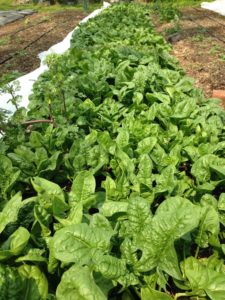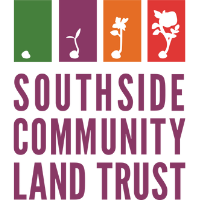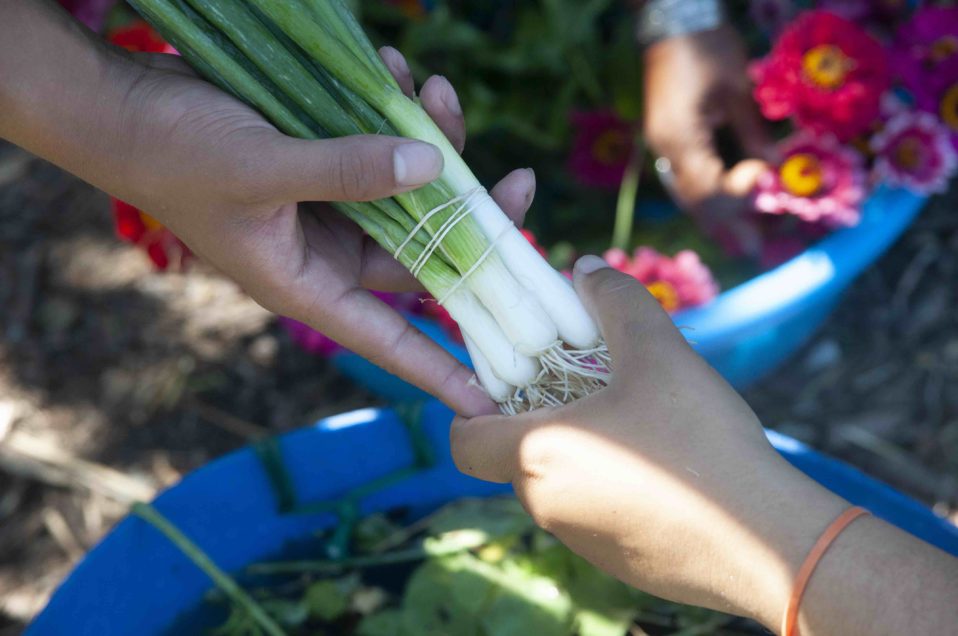SCLT staff adapt programs to expand food access, ensure farmer safety in wake of COVID-19
COVID-19 has shone a bright light on health disparities in this country, where underlying medical conditions, coupled with increased exposure to the virus, are causing a shockingly disproportionate number of Black and Brown people to die from the disease. These conditions, including heart disease, type 2 diabetes and obesity, largely result from nutritious food being out of reach of most low-income Americans. Now, working on the front lines, in grocery stores, hospitals and nursing homes, their risks are magnified.
The health crisis makes SCLT’s mission to help people grow and buy healthy, affordable food more urgent than ever. We are here for people who lose their jobs and want to grow food to feed their families. Our community gardens relieve the burden on the emergency food system while empowering people to control this aspect of their lives. Just as importantly, growing food itself has health benefits, from exercise to stress relief.
We are also here for small-scale, local farmers who must find new markets because so many restaurants are closed. SCLT resources and programs will help them weather this storm so they can continue to provide food now, and after, the pandemic.
Here are other, specific ways SCLT is responding to the crisis
Food Access
Preserving the Plant Sale to support home and community gardeners, as well as local nonprofits, has been our biggest challenge this spring. “I knew we couldn’t distribute thousands of plants safely in one weekend, so we designed an online ordering system with prepaid, curbside pickup, spread over seven days,” said Development Director Shana Santow.
Shana anticipates Plant Sale customers will take home roughly 15,000 plants, which significantly adds to the local supply of fresh produce. In addition, SCLT will donate 3,000 vegetable starts to gardeners in need, helping hundreds feed their families this summer and beyond. As in the past, SNAP payments will be accepted at the Sale. “My hope is that we reach as many people as we can,” said Shana.
This year we are piloting a program with Brown Family Medicine, the Pawtucket YMCA and Groundwork RI, funded by the Integra Community Care Network, that will benefit 20 Pawtucket families enrolled in Medicaid. Each family will receive a bi-weekly share
of fresh produce grown by farmers in our Produce Aggregation Program. Families will also receive nutrition, exercise, cooking, and gardening education. Thanks to a grant last month from the COVID-19 Response Fund, 10 additional seniors in Pawtucket will also participate. “Data shows that when people have access to fresh produce and other health supports they have better health outcomes,” said SCLT Project Director Jazandra Barros.
Community Gardens
Right now, our network of community gardens in Providence, Pawtucket and Central Falls provides garden-fresh food to 3,000 people per year. This number grows annually as we open and expand our properties. This spring we have new plots at the Charles Street and Sideyard Community Gardens.
To keep gardeners safe, Community Gardens Coordinator Andrew Cook has been reaching out to garden leaders about social distancing protocols. He has posted information about COVID-19 at every SCLT-owned garden, translated into the languages most used at each, including Kirundi, Swahili, Nepali and Hmong. Staff are building hand-washing stations at gardens and farms, and will be providing face masks to farmers and their families.
Support for Farmers
Craig Demi, SCLT’s Operations Director, says staff have called each farmer in our Produce Aggregation Program about the coronavirus, and that they speak regularly about how it’s affecting their operations. “Some farmers are keeping production the same, hoping to take advantage of new marketing possibilities, while others are scaling back their staff,” he said. “Everything changes from week to week, so some aren’t sure about their production plans at this point.”
Craig and other staff are advising farmers on implementing safe work protocols, marketing opportunities and loans or grants related to COVID-19. Training workshops will be cancelled, or postponed, but staff will offer remote or in-field training.
Farmland Access
Following a Farmland Access Mixer in January attended by 80 people, SCLT staff and other members of the RI Land Access Working Group are continuing to facilitate conversations between landowners and land seekers.
This summer, SCLT is partnering with Movement Ground Farm to grow on SCLT-leased land in Tiverton. We will sell half of the food harvested there through SCLT’s Produce Aggregation Program.
We know that increased unemployment and disruptions in the food supply will perpetuate negative and disproportionate outcomes
in communities of color. Sebastian Interlandi, SCLT’s Director of Programs, is advocating for a response that includes making more farmland available for people who can build the local food supply in communities where fresh, affordable food is scarce. Two potential new sites are in Newport County and another two are in North Kingston.
Safeguarding access to healthy food is especially critical so we can help the most vulnerable among us, in particular, to stay strong.
It is only through investments that SCLT and our supporters
have made over the past 40 years that we are able to rely on community gardeners and urban and rural farmers to help when our communities are in crisis.
We are committed to helping gardeners, farmers and their families make it through this dark time. When the virus is behind us, we’ll resume building more farms, gardens, and food businesses for a healthier future.
– Jenny Boone, SCLT Grants & Communications Manager


